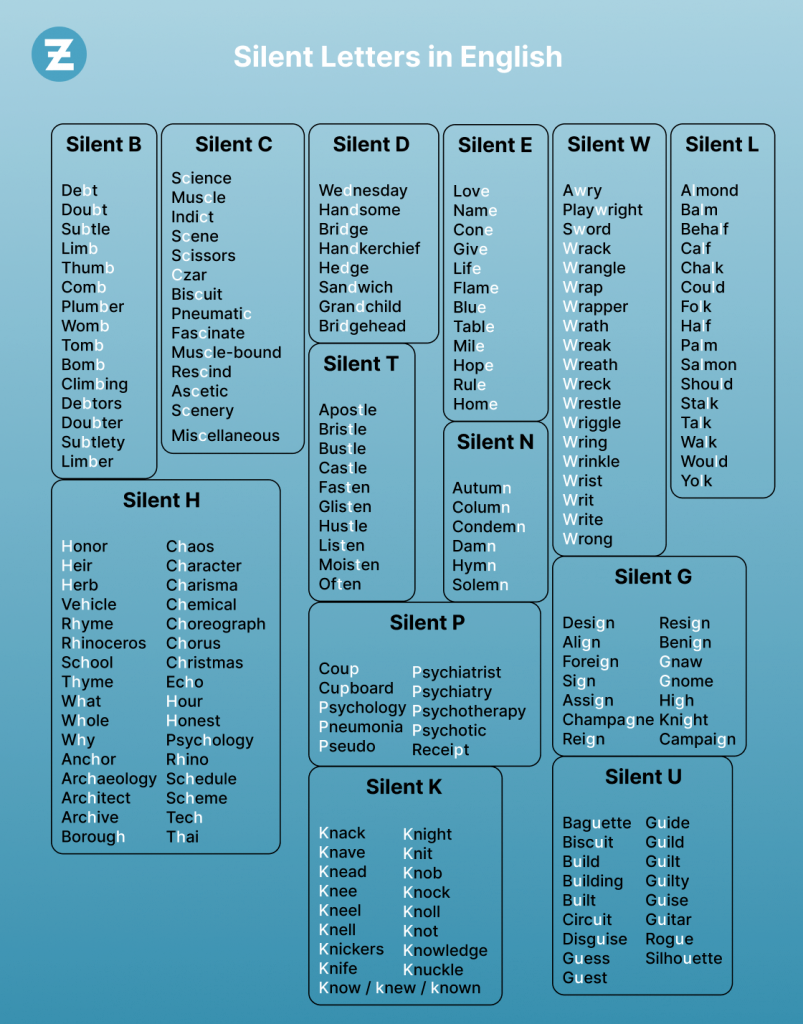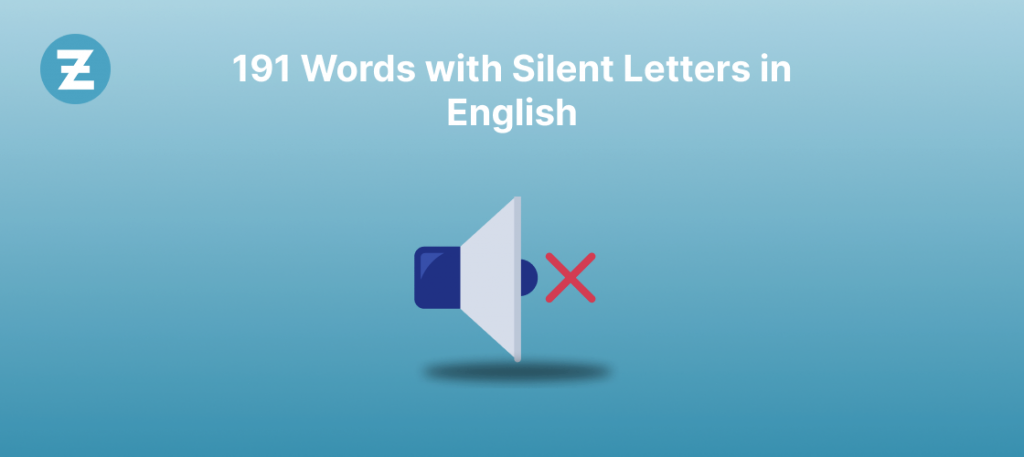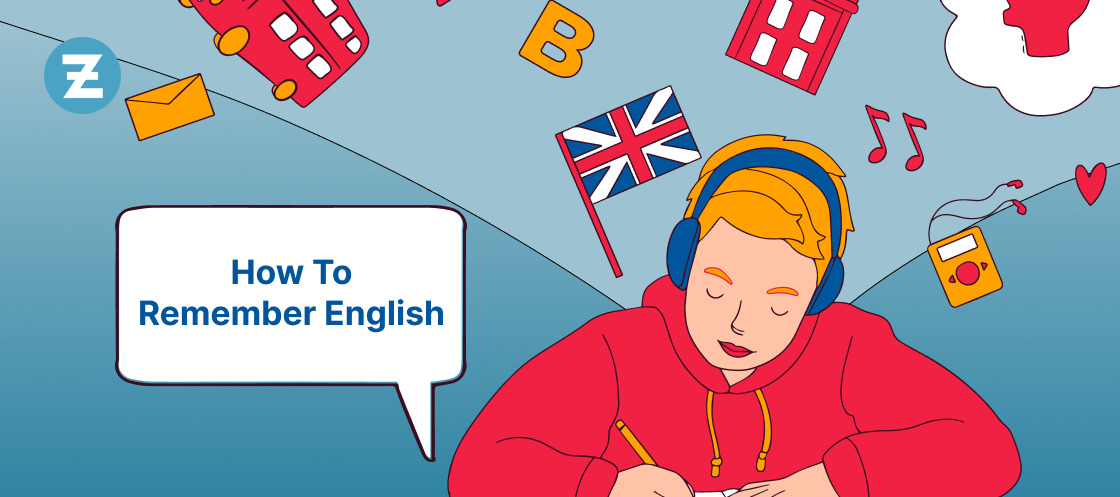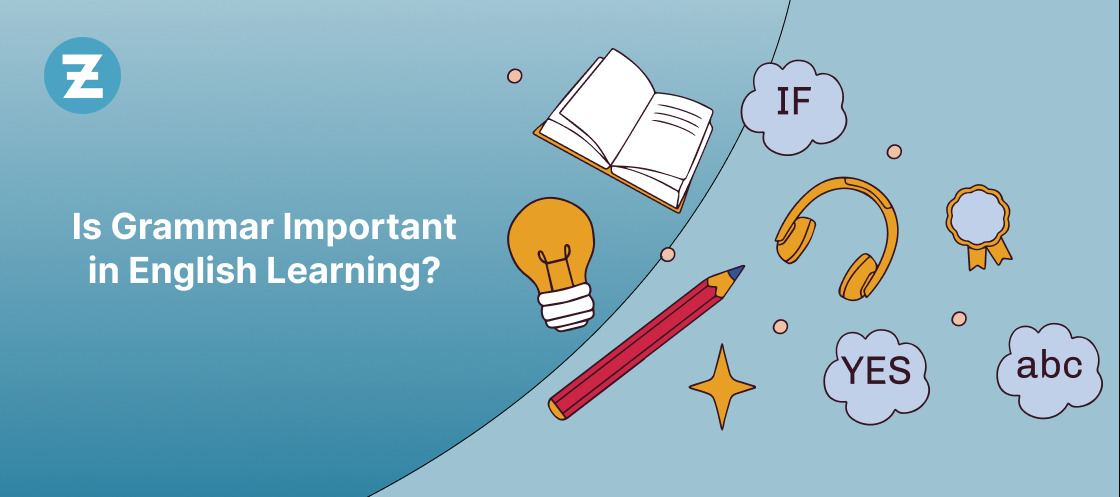Silent letters are a peculiar feature of the English language – letters written in words but not pronounced. They lurk on the page, invisible to the ear, yet they play an important role in shaping our language.
Whether you’re a native speaker or just starting to learn English, mastering silent letters can be a challenge. That’s why we’ve compiled a comprehensive list of words containing silent letters, which you can access anytime by bookmarking this page.
And if you want to have some fun while improving your pronunciation skills, check out our zoundslike app It’s a great way to practice speaking English and discover the hidden secrets of silent letters!
Read Also: 8 Ways To Improve Your English Accent
Why Does English Have Silent Letters?
English has silent letters for various reasons, such as historical changes in pronunciation, the influence of other languages, and preserving the spelling of words borrowed from other languages.
Many silent letters in English were once pronounced but have become silent over time as the language evolved.
For example, the “k” in “knight” was pronounced in Old English but became silent in Middle English. Some silent letters were introduced into English words from other languages, such as the “b” in “debt,” which comes from the French word “dette.”
Silent letters are also sometimes used in English to distinguish between words spelled similarly but with different meanings, such as “bare” and “bear.”
While they may be challenging for non-native speakers, silent letters are important to English spelling and pronunciation.
Now explore the world of silent letters In English by reviewing the following words.
|
Upgrade your English pronunciation and listening abilities with Zoundslike’s interactive learning platform! |
Types of Silent Letters In English
- Silent “B”: It is usually found at the end of a word, such as in the word “lamb” or “comb.”
- Silent “C”: There are two types of silent “C.” The first is found before the letters “e,” “i,” or “y,” as in the words “muscle,” “scissors,” or “indict.” The second type of silent “C” is found in some words borrowed from French, such as “debt” or “receipt.”
- Silent “D”: It is usually found in the middle of a word, such as in the word “sandwich” or “handsome.”
- Silent “E”: It is usually found at the end of a word, and there are several different types of silent “E.” One type is known as the “magic E,” which changes the pronunciation of the vowel that precedes it, as in the words “hope” and “hop.” Another type is found in some words borrowed from French, such as “roulette” or “blancmange.” In these words, the “E” is silent, meaning it is not pronounced.
- Silent “G”: It is usually found before the letters “n” or “h,” as in the words “gnat” and “ghost.”
- Silent “H”: It is usually found at the beginning of a word, such as in the words “honor” or “hour.”
- Silent “K”: It is usually found before the letter “n,” as in the word “know.”
- Silent “L”: It is usually found after the letter “a,” as in the word “calm.”
- Silent “N”: It is usually found after the letter “m,” as in the word “autumn.”In this word, the “N” is silent and not pronounced.
- Silent “P”: It is usually found at the beginning of some words, such as “psychology” or “pneumonia.”
- Silent “T”: There are several types of silent “T.” The first occurs when the letter “T” is not pronounced in a word, despite being present. This often happens in the middle of words such as “castle” or “often.” The second type of silent “T” is found in some words borrowed from French, such as “ballet” or “depot.”
- Silent “U”: It is usually found after the letter “Q,” as in the word “queen.”
- Silent “W”: It is usually found at the beginning of some words, such as “write” or “wrist.”
|
Improve your listening and speaking skills in English with Zoundslike’s fun and easy-to-use app! |
Words With Silent Letters

To better remember words that include silent letters in english, try speaking them aloud in a sentence. This technique can aid in improving your recall and pronunciation skills.
Give it a try with the following words:
Words With Silent B
- Debt – /dɛt/ (det)
- Doubt – /daʊt/ (dowt)
- Subtle – /ˈsʌtəl/ (sut-tuhl)
- Limb – /lɪm/ (lim)
- Thumb – /θʌm/ (thuhm)
- Comb – /koʊm/ (kohm)
- Plumber – /ˈplʌmər/ (pluhm-er)
- Womb – /wuːm/ (woom)
- Tomb – /tuːm/ (toom)
- Bomb – /bɑm/ (bahm)
- Climbing – /ˈklaɪmɪŋ/ (kly-ming)
- Debtors – /ˈdɛtərz/ (det-ers)
- Doubter – /ˈdaʊtər/ (dow-ter)
- Subtlety – /ˈsʌtl̩ti/ (sut-l-tee)
- Limber – /ˈlɪmbər/ (lim-bur)
Words With Silent C
- Science – /ˈsaɪəns/ (sigh-əns)
- Muscle – /ˈmʌsl/ (muh-suhl)
- Indict – /ɪnˈdaɪt/ (in-dyt)
- Scene – /sin/ (seen)
- Scissors – /ˈsɪzərz/ (siz-erz)
- Czar – /zɑr/ (zar)
- Biscuit – /ˈbɪskɪt/ (bisk-it)
- Pneumatic – /njuːˈmætɪk/ (noo-mat-ik)
- Fascinate – /ˈfæsɪneɪt/ (fas-uh-neyt)
- Muscle-bound – /ˈmʌslˌbaʊnd/ (muh-suhl-bound)
- Rescind – /rɪˈsɪnd/ (rih-synd)
- Ascetic – /əˈsɛtɪk/ (uh-set-ik)
- Scenery – /ˈsinəri/ (seen-uh-ree)
- Miscellaneous – /ˌmɪsəˈleɪniəs/ (mis-uh-ley-nee-uhs)
Read Also: English words with the same spelling and different meaning
Words With Silent D
- Wednesday – /ˈwɛnzdeɪ/ (wenz-day)
- Handsome – /ˈhænsəm/ (han-suhm)
- Bridge – /brɪdʒ/ (brij)
- Handkerchief – /ˈhæŋkərtʃɪf/ (hang-ker-chif)
- Hedge – /hɛdʒ/ (hej)
- Sandwich – /ˈsænwɪtʃ/ (san-wich)
- Grandchild – /ˈɡræntʃaɪld/ (grant-chyld)
- Bridgehead – /ˈbrɪdʒhɛd/ (brij-hed)
Words With Silent E
- Love – /lʌv/ (luv)
- Name – /neɪm/ (naym)
- Cone – /koʊn/ (kohn)
- Give – /ɡɪv/ (giv)
- Life – /laɪf/ (lyf)
- Flame – /fleɪm/ (flaym)
- Blue – /blu/ (bloo)
- Table – /ˈteɪbl/ (tay-buhl)
- Mile – /maɪl/ (myl)
- Hope – /hoʊp/ (hohp)
- Rule – /ruːl/ (rool)
- Home – /hoʊm/ (hohm)
Words With Silent G
- Design – /dɪˈzaɪn/ (di-zyne)
- Align – /əˈlaɪn/ (uh-lyne)
- Foreign – /ˈfɔrɪn/ (for-in)
- Sign – /saɪn/ (sine)
- Assign – /əˈsaɪn/ (uh-syne)
- Champagne – /ʃæmˈpeɪn/ (sham-payn)
- Reign – /reɪn/ (rayn)
- Resign – /rɪˈzaɪn/ (rih-zyne)
- Benign – /bɪˈnaɪn/ (bih-nyne)
- Gnaw – /nɔ/ (naw)
- Gnome – /noʊm/ (nohm)
- High – /haɪ/ (hye)
- Knight – /naɪt/ (nyte)
- Campaign – /kæmˈpeɪn/ (kam-payn)
Words With Silent H
- Honor – /ˈɑnər/ (ah-nur)
- Heir – /ɛr/ (air)
- Herb – /hɜrb/ (erb)
- Vehicle – /ˈviːɪkl/ (vee-i-kl)
- Rhyme – /raɪm/ (ryme)
- Rhinoceros – /raɪˈnɑsərəs/ (rye-nuh-suh-ruhs)
- School – /skuːl/ (skool)
- Thyme – /taɪm/ (time)
- What – /wʌt/ (wut)
- Whole – /hoʊl/ (hole)
- Why – /waɪ/ (wye)
- Anchor – /ˈæŋkər/ (ang-kuhr)
- Archaeology – /ˌɑrkiˈɑlədʒi/ (ahr-kee-ol-uh-jee)
- Architect / architecture – /ˈɑrkɪtɛkt/, /ˈɑrkɪtɛkʧər/ (ahr-kih-tekt, ahr-kih-tek-chur)
- Archive – /ˈɑrkɪv/ (ahr-kiv)
- Borough – /ˈbʌroʊ/ (buhr-oh)
- Chaos – /ˈkeɪɑs/ (kay-os)
- Character / characteristic – /ˈkærəktər/, /ˌkærəktəˈrɪstɪk/ (kar-uhk-ter, kar-uhk-tuh-ris-tik)
- Charisma – /kəˈrɪzmə/ (kuh-riz-muh)
- Chemical / chemistry / chemist – /ˈkɛmɪkəl/, /ˈkɛmɪstri/, /ˈkɛmɪst/ (kem-ik-uhl, kem-uh-stree, kem-ist)
- Choreograph – /ˈkɔrəˌɡræf/ (kor-uh-graf)
- Chorus – /ˈkɔrəs/ (kor-uhs)
- Christmas / Christian – /ˈkrɪsməs/, /ˈkrɪʃtʃən/ (kris-muhs, kris-chuhn)
- Echo – /ˈɛkoʊ/ (ek-oh)
- Hour – /ˈaʊər/ (ow-ur)
- Honest / honor – /ˈɑnɪst/, /ˈɑnər/ (ahn-ist, ahn-er)
- Psychology – /saɪˈkɑlədʒi/ (sahy-kol-uh-jee)
- Rhino – /ˈraɪnoʊ/ (rye-noh)
- Schedule – /ˈskɛdʒul/ (skej-ool)
- Scheme – /skiːm/ (skeem)
- Tech / technology / techie – /tɛk/, /tɛkˈnɑlədʒi/, /ˈtɛki/ (tek, tek-nol-uh-jee, tek-ee)
- Thai / Thailand – /taɪ/, /ˈtaɪlænd/ (tai, ty-land)
|
Improve your English language proficiency with Zoundslike’s fun and interactive learning platform. |
Words With Silent K
- Knack – /næk/ (nak)
- Knave – /neɪv/ (nayv)
- Knead – /niːd/ (need)
- Knee – /niː/ (nee)
- Kneel – /niːl/ (neel)
- Knell – /nɛl/ (nel)
- Knickers – /ˈnɪkərz/ (nik-urz)
- Knife – /naɪf/ (nyf)
- Knight – /naɪt/ (nyt)
- Knit – /nɪt/ (nit)
- Knob – /nɑb/ (nob)
- Knock – /nɑk/ (nok)
- Knoll – /noʊl/ (nol)
- Knot – /nɑt/ (not)
- Know / knew / known – /noʊ/, /njuː/, /noʊn/ (noh, noo, nohn)
- Knowledge – /ˈnɑlɪdʒ/ (nol-ij)
- Knuckle – /ˈnʌkəl/ (nuhk-ul)
Words With Silent L
- Almond – /ˈɑːmənd/ (ah-muhnd)
- Balm – /bɑːm/ (bahm)
- Behalf – /bɪˈhɑːf/ (bih-hahf)
- Calf – /kæf/ (kaf)
- Chalk – /tʃɔːk/ (chawk)
- Could – /kʊd/ (kud)
- Folk – /foʊk/ (fohk)
- Half – /hæf/ (haf)
- Palm – /pɑːm/ (pahm)
- Salmon – /ˈsæmən/ (sam-uhn)
- Should – /ʃʊd/ (shud)
- Stalk – /stɔːk/ (stawk)
- Talk – /tɔːk/ (tawk)
- Walk – /wɔːk/ (wawk)
- Would – /wʊd/ (wud)
- Yolk – /joʊk/ (yohk)
Words With Silent N
- Autumn – /ˈɔːtəm/ (aw-tuhm)
- Column – /ˈkɑːləm/ (kol-uhm)
- Condemn – /kənˈdem/ (kuhn-dem)
- Damn – /dæm/ (dam)
- Hymn – /hɪm/ (him)
- Solemn – /ˈsɑːləm/ (sol-uhm)
Words With Silent P
- Coup – /kuː/ (koo)
- Cupboard – /ˈkʌbərd/ (kuhb-uhrd)
- Psychology – /saɪˈkɑːlədʒi/ (sahy-kol-uh-jee)
- Pneumonia – /nuːˈmoʊniə/ (noo-moh-nee-uh)
- Pseudo – /suːdoʊ/ (soo-doh)
- Psychiatrist – /saɪˈkaɪətrɪst/ (sahy-kahy-uh-trist)
- Psychiatry – /saɪˈkaɪətri/ (sahy-kahy-uh-tree)
- Psychotherapy – /ˌsaɪkoʊˈθerəpi/ (sahy-koh-ther-uh-pee)
- Psychotic – /saɪˈkɑːtɪk/ (sahy-kot-ik)
- Receipt – /rɪˈsit/ (ri-seet)
Read Also: Everyday Phrases You Might Be Saying Incorrectly
Words With Silent T
- Apostle – /əˈpɑːsəl/ (uh-pos-uhl)
- Bristle – /ˈbrɪsl/ (bris-uhl)
- Bustle – /ˈbʌsl/ (buhs-uhl)
- Castle – /ˈkæsl/ (kas-uhl)
- Fasten – /ˈfæsn/ (fas-uhn)
- Glisten – /ˈɡlɪsən/ (glis-uhn)
- Hustle – /ˈhʌsl/ (huhs-uhl)
- Listen – /ˈlɪsn/ (lis-uhn)
- Moisten – /ˈmɔɪsn/ (moi-suhn)
- Often – /ˈɔːfn/ (aw-fuhn)
Words With Silent U
- Baguette – /bæˈɡɛt/ (bah-get)
- Biscuit – /ˈbɪskɪt/ (bis-kit)
- Build – /bɪld/ (bild)
- Building – /ˈbɪldɪŋ/ (bild-ing)
- Built – /bɪlt/ (bilt)
- Circuit – /ˈsɜːrkɪt/ (sur-kit)
- Disguise – /dɪsˈɡaɪz/ (dis-guys)
- Guess – /ɡɛs/ (ges)
- Guest – /ɡɛst/ (gest)
- Guide – /ɡaɪd/ (gahyd)
- Guild – /ɡɪld/ (gild)
- Guilt – /ɡɪlt/ (gilt)
- Guilty – /ˈɡɪlti/ (gil-tee)
- Guise – /ɡaɪz/ (guyz)
- Guitar – /ɡɪˈtɑːr/ (gi-tar)
- Rogue – /roʊɡ/ (rohg)
- Silhouette – /ˌsɪluˈet/ (sil-oo-et)
|
Improve your listening and speaking skills in English with Zoundslike’s fun and easy-to-use app! |
Words With Silent W
- Awry – /əˈraɪ/ (uh-rye)
- Playwright – /ˈpleɪˌraɪt/ (play-rye-t)
- Sword – /sɔːrd/ (sord)
- Wrack – /ræk/ (rak)
- Wrangle – /ˈræŋɡəl/ (rang-guhl)
- Wrap – /ræp/ (rap)
- Wrapper – /ˈræpər/ (rap-uhr)
- Wrath – /ræθ/ (rath)
- Wreak – /riːk/ (reek)
- Wreath – /riːθ/ (reeth)
- Wreck – /rɛk/ (rek)
- Wrestle – /ˈrɛsl/ (res-uhl)
- Wriggle – /ˈrɪɡəl/ (rig-uhl)
- Wring – /rɪŋ/ (ring)
- Wrinkle – /ˈrɪŋkəl/ (rink-uhl)
- Wrist – /rɪst/ (rist)
- Writ – /rɪt/ (rit)
- Write / wrote / written – /raɪt/ (ryt)
- Wrong – /rɔːŋ/ (rawng)
Conclusion
In conclusion, silent letters are an important aspect of the English language, and understanding their usage and pronunciation can greatly improve your spelling and communication skills. While it can be challenging to learn all the rules and exceptions surrounding silent letters, practicing and familiarizing yourself with them can make a big difference.
Remember that silent letters can be found in various parts of English words, including at the beginning, middle, or end. Some are a result of historical changes in pronunciation, while others were added to reflect the etymology of a word. Silent letters can also provide clues about a word’s meaning and origin.
You can further improve your spelling and communication skills by being aware of common mistakes with silent letters, such as mispronouncing or omitting them.
If you want to practice pronouncing English words in a fun way with friends, then download our English learning app Zoundslike.
FAQs
Q.1 What are silent letters in English?
Silent letters are letters in English that are not pronounced but still affect the word’s spelling and meaning.
Q.2 Why are there silent letters in English words?
Silent letters often reflect the history and etymology of a word and can provide valuable information about its origins and meaning.
Q.3 What are some common silent letters in English?
Common silent letters include the “K” in “knight,” the “B” in “debt,” the “G” in “gnome,” and the “E” at the end of words like “bake” and “love.”
Q.4 Are silent letters found in all languages?
No, silent letters are a feature of English; not all languages use them similarly.
Q.5 Can silent letters be added or removed from words?
Silent letters are part of a word’s spelling and cannot be added or removed without changing the word’s meaning and pronunciation.








